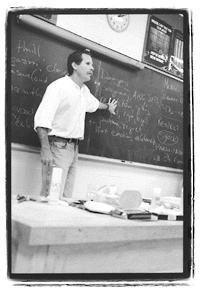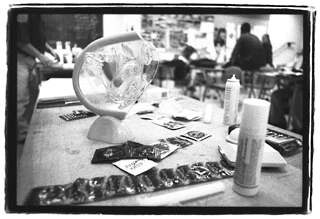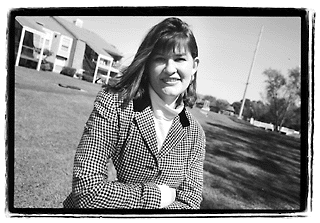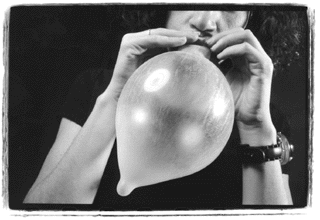Let's Talk About Sex, Bay-bee
AISD Teaches Kids About the Birds and Bees
By Roseana Auten, Fri., May 2, 1997
|
|
Hayes asks the class to list the many messages they've received about sex, and scribbles their answers on the blackboard. "Glamourous." "Abstinence." "Fun." "Wait 'til you're married." "Dangerous." "Need to be mature." "You're bad if you do -- except guys." "Pregnancy." "Important."
What are some of the sources of these messages? Hayes asks. "Parents," says one student. "The movies," says another. So, messages about how we're supposed to behave are everywhere, aren't they? Hayes asks them to consider how, as boys and girls begin to learn about what's expected behavior in their respective gender roles, what happens when they don't fulfill those roles. "What do we call girls who play sports and act aggressively?" Hayes asks.
"Tomboys," someone calls out.
"And boys who don't do sports and seem sensitive?" "Sissies."
And yet, the class generally agrees, the "tomboy" insult doesn't quite carry the same sting as "sissy." The latter expression is too close to, say, "girl," which is a real put-down -- if you're not one. And it's also too close to "gay," the worst slam of all. Considering the relatively few "social" advantages there are to being homosexual, the class then ponders whether gayness is something a person "chooses."
Whoa. A discussion about homosexuality, in a Texas public school classroom, the drift of which is that kids might be born gay rather than making a lifestyle choice? Enlightened, to say the least. And while some parents and educators believe that sex is an uncomfortable subject that should be stifled rather than discussed, most would disagree.
Numerous surveys say it over and over: In stark contrast to previous generations, people now support sex education in public schools. For example, a Texas Poll, conducted just two years ago for Harte-Hanks Communications, Inc., revealed that 63% of 1,011 adults surveyed by telephone believe that sex education at school is essential to stop the spread of HIV and other sexually transmitted diseases. But battle over the scope -- and content -- of sex education rages on.
Case in point: Experts agree that half of all high school students are sexually active. By graduation, 75% of all students will have been sexually active at some point in their secondary school careers. Some educators believe it just makes good sense, physically and emotionally, to present information about the dangers of sexual activity and encourage teens to remain sexually abstinent until marriage -- even help them create a kind of "reverse peer pressure" toward that end. Another school of thought says that approaching the "problem" of teen sexuality means discussing the risks of sex, to be sure, but also gauging, reducing, and eliminating the risks -- with the constant help and support of adults.
Current AISD policy allows for outside organizations such as the pro-choice Planned Parenthood and the avowedly pro-life Crisis Pregnancy Center to bolster existing high school health curriculum in the district. Both organizations visit high school health classes throughout Austin in their efforts to help students make those proverbial "healthy choices." But they also steer students toward different conclusions about what sex might mean in their lives -- both now, and in the future. Let's continue to drop in on both classes.
Sexual Messages and Refusal Skills
|
|
Students in the "LIFEGuard" group have already seen a slide show entitled Safe Sex, produced by the Austin-based Medical Institute for Sexual Health (MISH). Over the years, this slide show (the brainchild of now-retired gynecologist and MISH president Dr. Joe McIlhaney) has become rather controversial. Proponents of abstinence sexuality education love it; among other things, it addresses the risk of sexual activity by unflinchingly depicting the ravages of advanced stages of STDs upon human genitalia. But those who favor an approach that also includes education about reducing the risks through the use of condoms hate Safe Sex precisely for its "shock value." In any case, it's pretty graphic in some sections, and LIFEGuard generally shows it only to high school-age students.
After again naming all the various STDs, the means by which they are transmitted, and methods of treatment (when a treatment is available), Odom now shifts to helping students work on refusal skills. That is to say, strategies to steer clear of sexual intercourse, ways to simply say no. It's not impossible to say no, and it's best for physical, emotional, and mental health, he tells the class. You don't have to be trapped into sex.
Odom recruits two volunteers from the class -- a boy and a girl -- to role-play in fending off pressure from other people to do something they know they shouldn't. As the boy keeps trying to negotiate the loan of the girl's new car, the girl thinks of reasons why she can't lend her car to the boy. Her parents told her not to; it's a birthday present and it must not get wrecked; she just doesn't want to. Next, the tables are turned as the girl must pressure the boy for sex.
"Oh, come on. Have sex with me," she says.
"No."
"Oh, come on, you know you want to."
"No, I'm waiting," the boy says grandly, and the class erupts into giggles, as the two take their seats again.
Back in Hayes' Planned Parenthood class at Austin High, the students pursue a lively discussion about dating. They've arrived at an interesting conclusion: More students in Hayes' group agree than disagree that a guy should pay for everything on a date. "What if the girl asks him out?" a dissenter asks. "Well, we do make more money than women, we might as well spend it," says a boy. But if a guy is paying for everything, then the girl feels pressured to at least act like she's having a good time, and accept the next date from him, even if she doesn't want to, a girl points out. Yeah, and he might expect something back, too, another adds. "Well, I'm not going to have sex with a guy just because he buys me a bagel, or something," another girl says.
"What if you removed money from the relationship? How would you show the other person respect?" Hayes asks.
"Talk to her. Give her your full attention," says a boy. "He's looking at your face instead of other places," says a girl.
Abstinence Makes the Heart Grow Fonder
|
|
LIFEGuard's Odom preaches abstinence, first and foremost. He informs the class that although they may have heard a lot about using condoms to prevent disease and pregnancy, condoms are often improperly or inconsistently used, rendering them less than 100% effective. "That's why we're an abstinence-based program," he says. He has the class take turns reading the "Myth and Facts" page in the LIFEGuard booklet he has distributed to them, entitled "Abstinence Makes the Heart Grow Fonder."
One student reads aloud, "A condom has a 13-36% failure rate in preventing pregnancy, and a 100% failure rate for sexually transmitted diseases if used as protection over a period of years with one or more partners."
"Boy, that's pretty scary," says Odom. "If a condom breaks, which it does, many times, if there's a hole, then you're at risk for an STD or pregnancy."
Across town in the Planned Parenthood presentation, the class also zeros in on "abstinence" as the best no-risk practice. But, Hays also tells them that 26% of women who say that's their prime method of birth control don't use it. And condoms are given a little more credit.
For example, when a student asks, "Can't HIV pass through the pores of a condom?," Hayes replies: "You might hear that, but there's no medical evidence at all for that." He tells them that condoms (emphasizing that they must be used consistently, correctly, and with a spermicide) are a 98% effective barrier against pregnancy and STDs. Hayes notes that the figures show that sex with a condom is 10,000 times safer than unprotected sex -- which, as they've already established, is risky behavior. An exception to this, he adds, would be in the case of viral diseases such as herpes or genital warts, which can be spread through skin-to-skin contact, on areas that a condom doesn't cover.
Then, the Planned Parenthood class gets specific about how to use a condom. What would be the first step? "Buy it," responds a student. "Right, first you have to have one, don't you?" says Hayes, adding that free ones -- with no questions asked -- are available many places in Austin, including the Planned Parenthood clinic on East Seventh. A condom needs to be stored properly. It can't live for months in a guy's wallet -- the heat generated can weaken it, he reminds them. It needs to be checked for its expiration date, and by gently folding the packet in half and moving the air bubble around inside, one can ensure there isn't a hole. Next, carefully open the condom packet... Hayes pauses.
"I can't actually open one and show you," he says. "The school district's policy prevents me from doing that. But I can just talk you through the other steps..."
"When did they make that rule?" a student cuts in.
"That's kind of retarded," blurts another.
"You need to know how to do that," protests a third.
When Hayes' lecture has ended for the day, the students hunker around. On the whole, most of them value what Hayes has been doing in their class; they find the activities are fun and the information useful. Not that they need it for themselves so much, they say, but other people in the class probably do.
They chalk up the "no-showing-condoms" thing as another stupid decision by stupid school personnel who don't want to look at reality. Like so many other restrictions on them (such as closing the campus at lunch), it shows that adults just don't respect them, they say. They're not as suggestible as adults think they are, and are quite capable of evaluating the information they're given, thank you so much.
"I think talking about preventive measures -- like how to use a condom -- is more important than telling teenagers we'll die from AIDS," says a female student. "I mean, what do they think we think after seeing how one works? `These condoms work, therefore you should have sex?' No."
Other students are exasperated by the fact that condoms also aren't available through school. "It's like telling us, `Here's how you use a fork, but you can't have one,'" says another female student. "You can't eat," a boy finishes the metaphor.
But what's the problem, if condoms are available at every drug store and grocery in the city? Like many adults, teens can be terribly embarrassed by having to go buy them. If someone sees them, they say, then everyone knows they're preparing for sex. And hey, that's private.
"It's embarrassing. You just don't want to have to go through the Wal-Mart with condoms. You might have someone you love," says one male student. "You just don't want everyone to know."
But what about avoiding the whole question, staying abstinent until marriage? Isn't that a healthy option? While respecting the various moral or religious underpinnings of that decision, one student replies that it's "asking something of a generation that's completely `out there.' In 1955, that might be a reasonable assumption. But you cannot assume, or even hope, that a majority of American teenagers today will say, `Yes, I will not be sexually active, I promise,'" she says. "That is such a thing of the past, it's not even funny."
The class is filing out. Once again, shouldn't Hayes at least be talking about abstinence, first, as their best option for health and happiness? "Not reality," says a boy, shaking his head before passing to the next class.
I Pledge Virginity
|
|
What about that "choice," when it means being a sexually active teen, instead of an abstinent one? "I know that I'm not going to walk out of the classroom after a presentation and have every kid going, `Abstinence! Great!'" says Collins. "We don't tell them what to do. But I'll be there for them, no matter what their choice is or what happens to them."
But in the interest of trading only in facts, not opinion, she says, LIFEGuard does emphasize the failure rates of birth control. "Instead of saying, `Hey, try this,' we tell them that it may not work," Collins says.
"I think that is so scary," says Sharon Ingram, adolescent health education coordinator for People's Community Clinic, which also does outreach -- and many, many pregnancy and HIV tests for teens. "They'll think, `Why bother using a condom?'" Scare tactics, such as advancing the inefficacy of condoms, doesn't work with adolescents, Ingram says.
Statistics (debatable ones, at that) about condom failure rates don't cut down on teen sex -- just safer teen sex, agrees Ellen Sanchez, director of education for Planned Parenthood of Austin. But a blasé demonstration of contraceptives doesn't change risky behavior, either, she adds. Teens need much more than that, they need to talk -- to adults. "We can tell them about birth control until we're blue in the face," she says. "But if they don't have a context for that information, it won't help them."
A key component of the LIFEGuard program occurs at the end, when lecturers ask that students sign a virginity pledge (or "secondary virginity," for those who have already given it away). But Sanchez doubts the effect the LIFEGuard program, and its virginity pledge, has on the long-term postponement of sex. "It all gets written off by the kids," Sanchez says, "and it sets up a barrier, so that kids don't feel comfortable going to adults for guidance any more."
Without specifically indicting Planned Parenthood, Collins counters that other approaches only serve to send "a mixed message" about whether or not having sex is a smart choice.
But AISD Board of Trustees President Kathy Rider is not so ready to embrace LIFEGuard -- the abstinence pledge, voluntary or not, is a problem. "That is coercive. Give me a break," she says. "We need to provide an environment for discussion -- and that does not include revealing personal information."
Loretta McHan, a health teacher at Crockett High, has used Planned Parenthood in her health course before (and will again), but agrees with Collins that LIFEGuard's approach is less confusing to students. "It helps the students learn to avoid that whole sexuality issue in a relationship," she says, as well as teaching the physical and emotional "downsides" of sex. And McHan says her students tell her they appreciate the consistent message -- that sexual activity is a bad choice.
On the other hand, Barbara Behne, health teacher at Austin High, has used Planned Parenthood presentations in her classes for years because "it gets my students talking and asking questions, more than I would be able to on my own."
Planned Parenthood's Sanchez readily agrees that kids need to understand the possible "consequences" of sexual activity. But more than that, she says, they need ways to think about relationships, and to be trusted with the truth, so they can make a good decision -- such as deciding to postpone having sex. "We don't tell them what to do," Sanchez says. "We tell them to raise questions."
The debate rages on.
Back in Odom's classroom, the students have reached the end of the LIFEGuard presentation. In his chattery nervousness, Odom has forgotten to leave himself enough time for any questions the students might have. Next time, maybe. The kids pause to consider whether to sign and return a card on the back page of their pamphlet, pledging a new commitment to sexual abstinence. No one has to sign it, Odom says, just if they want to. No pressure. A majority sullenly hands him their cards and files out the door.
Ultimately, they're all on their own.
Got something to say on the subject? Send a letter to the editor.










